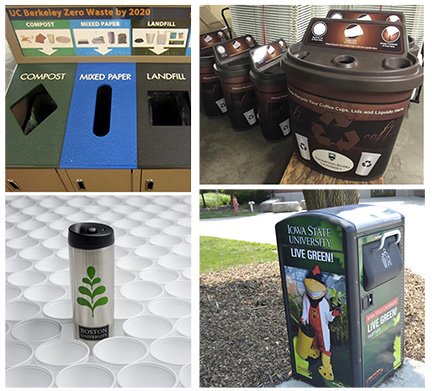Campus Sustainability Month: How Colleges & Universities are Going Green
Since 2003, hundreds of green campuses have participated in Campus Sustainability Day (historically held on the 4th Wednesday in October). Building on the success over the past decade, AASHE (The Association for the Advancement of Sustainability in Higher Education) has invited campuses to participate in events throughout October during Campus Sustainability Month.
Green college events taking place across the country include Kill The Cup 2015 University Challenge, a four-week campaign to reduce waste from disposable coffee cups, Project Green Challenge where participants compete in green themed challenges for prizes, book swaps, costume exchanges, campus clean-up events and more.
Colleges and universities have been visionaries in the sustainability insurgency. In addition to offering sustainability degrees and courses, college sustainability departments work to reduce schools’ carbon footprints, promote green building/infrastructure/purchasing and help students find green jobs upon graduation. In August, Sierra magazine, the official publication of the Sierra Club, released its ninth annual “Cool Schools” ranking of America’s greenest colleges and universities. This year more than 150 schools filled out Sierra’s extensive survey of sustainability practices on campus.
Sustainability efforts are at the forefront of campus recycling programs which are some of the most cutting-edge programs in North America.
University of California Berkeley is committed to being a zero waste campus by 2020. Campus Recycling and Refuse Services offers a variety of unique recycling bins for traditional mixed paper and can/bottle recycling as well as composting. Educational images attached to the bins help people determine where waste should go.
Like Berkeley, Thompson Rivers University in Canada is also working to educate students, employees and campus visitors about waste disposal with educational posters at university zero waste stations. These posters help reduce recycling bin contamination. Thompson Rivers University recently unveiled coffee cup recycling bins for separating lids, cups, excess liquids and keeping the campus green.
Iowa State University introduced new streamlined recycling bins in campus cafes. Streamlined bins allow for metals, glass and plastics to be recycled into one bin.
One of biggest campus sustainability hurdles is reducing campus dining waste. Food waste continues to be a challenge at dining halls. Composting food waste is becoming more common-place in dining halls and many universities are moving away from buffet-style dining and instead offering a-la-cart dining so students only order what they will eat. In addition to food waste, dining halls have eliminated items destined for landfills such as single-serve condiment packages and straws. Colleges are also eliminating trays to cut down on water used to clean them. And some colleges, like Boston University, offer students discounts for using reusable drinkware. Universities are also supporting and investing in their communities by supporting and investing in local agriculture.
Colleges and universities are preparing the next generation of leaders and we hope students carry their commitment to sustainability into all facets of their lives.
Photos via: UC Berkley, Iowa State, Thompson Rivers University and Boston University



